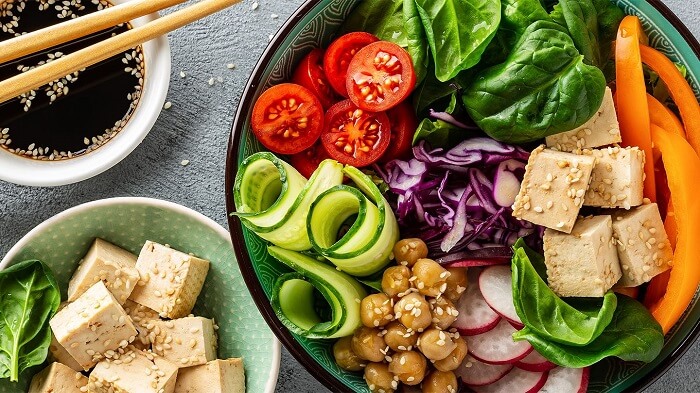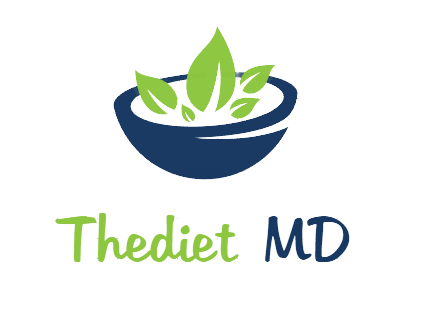The vegan diet consists of not eating any food of animal origin with a philosophy that aims to care for health and respect animals. But, the vegan diet does not focus only on not consuming meat or fish but also the by-products obtained from animals such as milk, cheese, eggs, or honey, among others, but all the products that are made through the death of an animal, such as footwear, bags, wool or leather garments. Thus, veganism is based on not eating or using any food or by-product of animal origin in the preparation of meals.
Table of Contents
What is the Vegan Diet
Being vegan or following a vegan diet goes beyond following a vegetarian trend as a dietary habit; veganism proposes a lifestyle that seeks to care for people’s health and respects the environment and animals.
A vegan person does not consume any food of animal origin or by-products obtained from his death. The argument of those who follow a vegan diet is based on how many millions of animals die and live inhumanly on farms to meet the needs of millions of people.
Fact: A vegan diet can provide all the essential nutrients for optimal health, including protein, iron, calcium, and omega-3 fatty acids. However, it’s crucial to plan the diet carefully and include a variety of nutrient-rich foods to ensure adequate intake of these nutrients.(1)

Other arguments by vegans are based on research that directly links animal fat consumption with cardiovascular problems. Some nutritionists agree to increase the consumption of vegetables, fruits, and nuts in the diet.
In short, the vegan diet seeks to encourage people to have a healthier life without consuming any animal product or by-product, but considering that there will be a deficit in vitamin B12 provided to the body since it is found mainly in eggs and dairy.
Embracing veganism is not just a dietary choice; it’s a conscious decision to enhance personal health, show compassion to animals, and tread lightly on our planet.
How to do the Vegan Diet
Those who want to become vegan must be clear about a fundamental principle since veganism requires being healthy by balancing the daily diet. Common nutrient deficiencies will be generated if only fruits and vegetables are eaten. After all, it is not easy to replace animal nutrients, such as vitamins, proteins, or minerals.
Fact: A strict vegan diet has been shown to offer distinct health advantages over vegetarian and omnivorous diets. One of the key findings is that vegans tend to have a unique gut microbiota profile characterized by a reduced abundance of pathobionts (potentially harmful microbes) and a greater abundance of protective species. (2)
To start with a vegan diet, it is advisable to consult a nutritionist to find out if this type of eating plan is healthy based on sex, age, weight, and diseases, among other factors such as if it is an athlete or woman in certain stages of their life where they undergo significant changes in their body.

In addition to varied fruits and vegetables, to make a vegan diet, it is necessary to complete the diet with nuts, eat foods rich in vitamin C, and control the correct consumption of vitamin B12 by adding daily cereals, juices, milk, and vegetable margarine and supplements.
It is also recommended to replace refined foods with whole grains with higher minerals and vitamins of group B and add legumes, limiting sunflower or corn oil using virgin olive oil.
Daily, take a tablespoon of flax oil or ground flax seeds to ensure a correct balance of Omega 3 and Omega 6, replace common salt with iodized salt, and drink a liter and a half of daily water.
What to Eat on the Vegan Diet
To design the daily menu of a vegan diet, it is necessary to consider specific guidelines so that the eating plan is balanced and healthy.
There are essential nutrients that must be present in vegan food, such as:
- Calcium: A mineral obtained mainly from milk, a prohibited food in the strict vegan diet. For this reason, it is necessary to consume alternative sources of calcium, such as broccoli, soy, or supplements, to complement what is needed for calcium.
- Iron is also an essential mineral found in red blood cells and is responsible for forming hemoglobin that transports oxygen transport from the lungs to all cells in the body. Lentils and chickpeas are excellent sources of iron, in addition to wheat, broccoli, grapes, and tofu.
- Zinc: This mineral should not be in short supply in the body and is found in nuts, some legumes, and vegetables in general.
- Essential fatty acids: They are obtained from vegetables, and as they are healthy fats, they help balance cholesterol, regulating blood pressure, being an excellent option to use raw olive oil.
- Amino acids and proteins: It is essential in the vegan diet to adapt the diet so that amino acids and proteins are not lacking; some products that can be added to the daily menu are legumes, nuts, seeds, soy milk, or tofu, or compensated with supplements.
Foods Allowed in the Vegan Diet
Among the foods that are allowed in the Vegan Diet, the most important are:
- Fruits.
- Vegetables.
- Whole grains
- Nuts.
- Seeds.
- Vegetables
- Soy products.
Prohibited Foods in the Vegan Diet
In a vegan diet, products of animal origin or their derivatives, including dairy and eggs, cannot be included in meals. Therefore, they are prohibited:
- Red meat, poultry, fish and seafood.
- Dairy products.
- Eggs.
- Animal fats.
- Honey.
- Food Additives.
Vegan Diet Menu Example
You can design the vegan diet in the way you want and according to the schedules and customs of each person. Desserts are allowed; you can eat baked sweets such as cakes or biscuits but prepared without butter, albumin, or eggs.
Here, we share the five-day menu of the Vegan Diet without animal protein. The menu for any day of the week can be repeated on Saturday and Sunday.
| Day | Meal | Items |
|---|---|---|
| Monday | Breakfast | One tablespoon of nuts, one whole wheat toast with tofu and tomato, one fruit smoothie |
| Midmorning | One whole wheat toast with young sprouts, cucumber, and carrot, one glass of soy milk | |
| Lunch | One veggie burger, one portion of chickpea stew with potato, one fruit | |
| Afternoon snack | Two whole grain cookies, one banana with walnuts | |
| Dinner | One serving of sautéed vegetables (aubergine, zucchini, onion, and pumpkin, vegan cheese, and a few drops of raw olive oil) | |
| Tuesday | Breakfast | One glass of orange, grapefruit, tangerine and pineapple smoothie, one tablespoon of almonds, one whole wheat biscuit with lamb’s lettuce and tomato |
| Midmorning | One glass of soy milk with natural cereal | |
| Lunch | One pasta dish (macaroni or spaghetti) with cooked celery and carrots, one apple | |
| Afternoon snack | One tablespoon of almonds, one money, one whole grain cookie with vegan cheese | |
| Dinner | One bowl of vegetable soup, one plate of salad with green leaves and tomato, one portion of olive pate, one kiwi | |
| Wednesday | Breakfast | One fruit smoothie (kiwi, apple, grape, and orange), two whole grain cookies, one glass of oat milk |
| Midmorning | 1 cup of green tea, one toast with tofu | |
| Lunch | One serving of grilled vegetables, one fruit | |
| Afternoon snack | One tablespoon of macadamia nuts, one money | |
| Dinner | One portion of cream of leeks, carrots, and zucchini, one whole wheat biscuit, one glass of soy milk | |
| Thursday | Breakfast | One tablespoon of nuts, two apricots, 1 fig, one toasted wholemeal flour with slices of cooked aubergines |
| Midmorning | Infusion of white tea, one apple, one banana | |
| Lunch | One serving of vegetable paella, Mediterranean salad, one soy yogurt | |
| Afternoon snack | One peach | |
| Dinner | One serving of vegetable cream, one glass of oatmeal water | |
| Friday | Breakfast | One fruit smoothie, one whole wheat biscuit, one tablespoon of nuts |
| Midmorning | One fresh fruit | |
| Lunch | One serving of roasted vegetables, one portion of dry pasta, one roasted apple | |
| Afternoon snack | One glass of soy milk | |
| Dinner | One serving of sautéed vegetables (aubergine, zucchini, onion, and pumpkin, vegan cheese, and a few drops of raw olive oil), one fresh fruit |
Important note
Each person can adapt this vegan menu to their particular needs, for example, more or fewer amounts of food, more protein, etc.) and also to the climate since meals can be based on hot foods and few raw foods.
Contraindications of the Vegan Diet
Before deciding to follow a vegan diet, it is necessary to have enough information and knowledge on the subject because when eliminating an extensive group of foods (those of animal origin), several nutrients are challenging to achieve only by consuming vegetables.
Vitamin B-12 and proteins cannot be lacking in the diet, as well as iron, calcium and Omega 3 fatty acids. One of the problems of vegans is that, in the long term, they will suffer from a deficiency of these substances. Therefore, they can lose muscle mass and eventually suffer from bone problems.
A vegan should eat a lot of dark leafy vegetables, whole grains, enriched cereals, and dried fruits, while to increase iron absorption, they will have to include many foods rich in vitamin C.
Advantages and Disadvantages of the Vegan Diet
The important thing about a vegan diet is that it is balanced, equivalent to including the necessary amounts of carbohydrates, fats, proteins, and micronutrients that the body needs.
Advantage
- It helps reduce bad cholesterol.
- It helps prevent arthritis.
- Improves the circulatory system.
- Provides fiber.
- It helps fight constipation.
- Prevents diabetes.
- It is low in fat.
Disadvantages
- It is pretty restrictive; therefore, eating out can result in minimal food offerings.
- It is very laborious; it may need well-adjusted planning and work to prepare the dishes.
Diet Recipes Vegan Diet
Following a vegan diet is easier if you have easy recipes that help lay out the daily menu. Therefore, here are some options that may be useful because they strictly adapt to veganism and are simple to prepare:
Vegetable and tofu soup
A tasty and colorful onion, beetroot, broccoli, and tofu soup, easy to make for lunch and dinner.
Ingredients
- Two onions.
- 1 beet
- ½ broccoli.
- 250 grs de tofu.
- Tamari.
- Olive oil.
- Shall.
- One bay leaf.
- Parsley.
Preparation
- Place a liter of tap water in a bowl and let it rest for an hour so that it loses its chlorine.
- Peel and cut the onion into half moons and sauté it in a saucepan with a splash of oil until caramelized.
- Add the broccoli, tofu, and diced beets to the onion.
- Add the broccoli sprigs. Add the tofu and diced beets. Season the preparation and stir until the vegetables are poached.
- Add the water and the bay leaf and cover the saucepan.
- After the first boil, lower the heat and let the soup cook for 15 minutes.
- Serve the spiced soup with a teaspoon of tamari and chopped parsley.
Vegan Tofu and Chickpea Burgers
Easy to prepare, these vegan burgers are made with tofu and chickpeas and can be served with tomato and a green salad.
Ingredients
- 100 grs de tofu.
- Two hundred fifty grams of cooked chickpeas.
- One potato
- One tomato.
- One bunch of watercress.
- One bunch of arugula.
- One red onion.
- One clove of garlic.
- ½.
- 75 gr of breadcrumbs.
- Water.
- Olive oil.
- Shall.
- Pepper.
- Ground cumin.
- Fresh coriander.
Preparation
- Cook the potato in a saucepan with water and a pinch of salt.
- In a frying pan with oil, sauté the chopped onion and garlic over low heat.
- Add the coriander and cumin to the preparation and cook for 5 minutes, then add the lemon juice and continue cooking for 5 minutes.
- Make a puree with the chickpeas, part of the tofu, reserving two slices and the potato and adding the cooked vegetables, mashed, and little breadcrumbs.
- Cover the bowl with plastic wrap and chill in the refrigerator for 30 minutes.
- Once the dough is cold, make the hamburgers and coat them with the breadcrumbs.
- Heat oil in a frying pan and fry the hamburgers, draining each on kitchen paper.
- Place the arugula and watercress in a bowl, dressing with a tablespoon of vinegar, olive oil, salt, and a few coriander leaves.
- Cut the buns in half and serve with each burger, making a sandwich with a tomato slice, accompanying the plate with a green salad and a piece of tofu.
Conclusions on the Vegan Diet
With opinions for and against the vegan diet, it has more and more followers. However, numerous studies suggest that there are reasons to recommend it, but with specific nuances so that it is healthy, does not take risks, and provides the body with the nutritional substances it needs.
The recommendation is that before starting a vegan diet or veganism, sufficient information and professional advice should be sought as this is the only way to avoid health problems due to the lack of essential nutrients.
Fact: Vegan diets, compared to lacto-ovo-vegetarian and non-vegetarian diets, offer significant protection against obesity, hypertension, type-2 diabetes, and cardiovascular mortality. Additionally, vegetarian diets confer protection against cardiovascular diseases, certain cancers, and overall mortality. Notably, the health benefits derived from these diets appear to be more pronounced in males than females. (3)
Sources and References:
- Comprehensive Pediatrics
Vegetarian diet and other alternative diets
- Research Journal – Bolivian Journals
Vegetarianism
- Department of Pediatrics, Obstetrics and Gynecology. The University of Valencia. Doctoral School. Catholic University of Valencia
Vegan diet in childhood: benefits and risks
Summary:
Adopting a vegan lifestyle emphasizes a plant-based diet, replacing animal-based foods with plant-based foods. This diet offers multiple health benefits, such as improved heart health, a reduced risk of heart disease, and potential protection against cancer. Although often associated with weight loss, due to its divergence from fatty western diets and omnivore diets, it’s essential to source key nutrients to avoid nutrient deficiency. Foods like beans become a critical source of protein, and nutritional yeast can help supplement crucial amino acids found in animal-based foods. While the vegan diet can combat chronic disease, proper planning is crucial to ensure nutritional completeness.
Reference:
https://intapi.sciendo.com/pdf/10.2478/arls-2019-0010
https://www.mdpi.com/2072-6643/6/11/4822/htm
https://www.who.int/news-room/q-a-detail/cancer-carcinogenicity-of-the-consumption-of-red-meat-and-processed-meat
My name is Ellie Lauderdale, MD and I am USA based professional Nutritionist .
I am a Registered Dietitian Nutritionist and board certified specialist in sports dietetics who is trained in integrative medicine. I have worked with hundreds of clients, from those suffering with chronic disease to professional and olympian athletes. My goal is to help optimize you from the inside so that you can feel, perform, and look your best on the outside.


